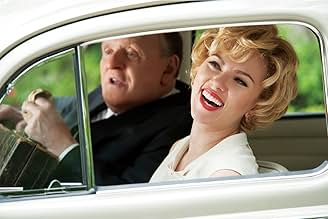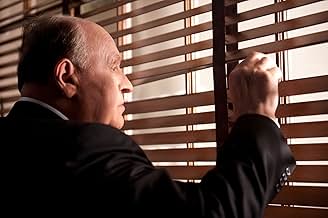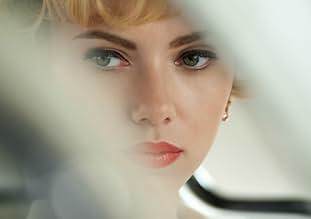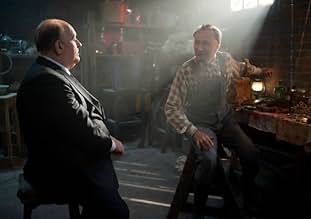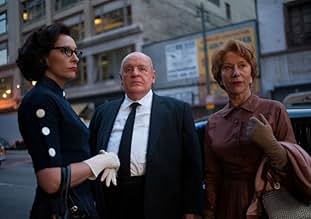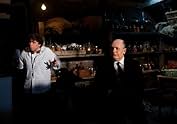Die Beziehung zwischen Alfred Hitchcock und seiner Frau Alma Reville während der Dreharbeiten zu Psycho (1960) im Jahr 1959 wird untersucht.Die Beziehung zwischen Alfred Hitchcock und seiner Frau Alma Reville während der Dreharbeiten zu Psycho (1960) im Jahr 1959 wird untersucht.Die Beziehung zwischen Alfred Hitchcock und seiner Frau Alma Reville während der Dreharbeiten zu Psycho (1960) im Jahr 1959 wird untersucht.
- Regie
- Drehbuch
- Hauptbesetzung
- Für 1 Oscar nominiert
- 6 Gewinne & 30 Nominierungen insgesamt
Empfohlene Bewertungen
"What if someone really good made a horror picture." After the success of North By Northwest Alfred Hitchcock (Hopkins) was looking for his next film to direct. After reading a book he finds what he is looking for. The studio is against it but Hitchcock decided to finance the movie himself, breaking all the rules as he goes. The story is real, the horror is real, this is the story of the making of Psycho. I'm not sure why but I am a big fan of movies about movies. I was very interested in seeing this not only for that but also because I am a big Anthony Hopkins fan and thought he would be a good choice for this role. The movie itself is really good with some pretty creepy aspects to it but the job that Hopkins does is pretty amazing and sometimes you actually see Hitchcock himself. I'm not sure how accurate this is but Hopkins played a man on the edge of sanity and knowing what I know about Hitchcock it seems to fit. If you are looking for a complete bio-pic of Hitchcock this is not it, but if you are a fan of his then this is a movie not to be missed. I recommend this. Overall, the movie is good but Hopkins is great. I give it a B+.
"Hitchcock" is a mix between a Hitchcockian thriller, a comedy, a biopic, and a romantic drama. And I'm pretty sure that explains the negative reactions to the film. I agree that it's a strange mix but it works with what they are going for. Wanting to focus on the marriage between Alma Reville and Alfred Hitchcock, a romantic biopic can be dry, so staying true to the spirit of the legendary director, the film throws in some wry humour and frames it all with the tone of a thriller.
It's 1950 and Alfred Hitchcock wants to make "Pyscho". Studios are wary, his wife is losing patience, and the battle to get it made could be worse than the subject matter. His long-time actress, Vera Miles (Jessica Biel), is being relegated to supporting status and isn't happy about the lack of respect from Hitchcock. Meanwhile, Hitchcock is ready to cast his new film and is going to turn Janet Leigh (Scarlett Johnasson) into a star. One would assume his wife would feel maligned from that, but she's off trying to forge her own career with screenwriter Whitfield Cook who Hitchcock thinks is a hack.
The film's main purpose appears to just be entertaining. Which is all good, but the rather poor reception is because it could have used some depth into the interesting inner-workings of Hitchcock. At times it comes off as a superficial caricature but the man was a legend because there was so much more to him. Anthony Hopkins appeared to be exactly like Hitchcock both physically and linguistically. He got his sly and comedic mannerisms and phrasing perfect. Which fits the entertaining and humorous frame for the picture.
Personally, I think director Sacha Gervasi used the right cues to make it feel like a Hitchcockian thriller. Throwing in references of his desire for the gruesome, throwing in references to "The Birds", and making us think there might be a wicked twist coming. The twist is just that "Hitchock" could be just a comedy — the material is ripe for that.
It's 1950 and Alfred Hitchcock wants to make "Pyscho". Studios are wary, his wife is losing patience, and the battle to get it made could be worse than the subject matter. His long-time actress, Vera Miles (Jessica Biel), is being relegated to supporting status and isn't happy about the lack of respect from Hitchcock. Meanwhile, Hitchcock is ready to cast his new film and is going to turn Janet Leigh (Scarlett Johnasson) into a star. One would assume his wife would feel maligned from that, but she's off trying to forge her own career with screenwriter Whitfield Cook who Hitchcock thinks is a hack.
The film's main purpose appears to just be entertaining. Which is all good, but the rather poor reception is because it could have used some depth into the interesting inner-workings of Hitchcock. At times it comes off as a superficial caricature but the man was a legend because there was so much more to him. Anthony Hopkins appeared to be exactly like Hitchcock both physically and linguistically. He got his sly and comedic mannerisms and phrasing perfect. Which fits the entertaining and humorous frame for the picture.
Personally, I think director Sacha Gervasi used the right cues to make it feel like a Hitchcockian thriller. Throwing in references of his desire for the gruesome, throwing in references to "The Birds", and making us think there might be a wicked twist coming. The twist is just that "Hitchock" could be just a comedy — the material is ripe for that.
In 1960, famed director Alfred Hitchcock released Psycho, the film to which his name would be more associated than any other film in his heralded career. In the new bio-film Hitchcock, Psycho is the backdrop for the story between the proclaimed 'Master of Suspense' and his wife and muse Alma Reville.
Directed by Sasha Gervasi (Anvil: The Story of Anvil), the film stars Sir Anthony Hopkins as the odd-shaped director and Dame Helen Mirren as his wife Alma. We pick things up in 1959 and Hitch's ("Just call me 'Hitch'. You can hold the 'cock'") introduction to the story of serial killer Ed Gein. Hitch had just released North by Northwest starring Cary Grant and he was fascinated in the story of Gein that was the inspiration for Robert Bloch's novel, Psycho.
Hitch aggressively pursued the optioning of the story and began to adapt it as a theatrical release. But Paramount Studios, to which Hitchcock was employed, was not eager to bring the gruesome tale about a transvestite and his murderous relationship with his dead mother to the big screen. Even with Hitchcock's clout (he had already released over 40 theatrical films by 1959) was not enough to sway studio bosses, and Hitchcock eventually had to finance the film himself and mortgage his home in an effort to get the film into production (this risky move proved lucrative as Hitchcock earned an estimated $15 million by fronting his own money for 60% of the gross profits).
The film takes us through all aspects of the production of the film from financing through casting; from fights with the ratings board through the limited release of the film in only 2 theatres nationally.
But at the heart of the film is the relationship between Hitch and his wife, Alma. Hitch is hardly represented as a caring and understanding sort. Hopkins plays him as an arrogant, demanding sod who wanted to control over his leading ladies as her secretly admired his blonde actress hires unprofessionally in his private office. He was a heavy eating, heavy drinking auteur that never won an Academy Award despite such revered films as Rebecca, The Birds and Vertigo having been crafted by his immense talent.
Alma, on the other hand, is portrayed as the 'wizard behind the curtain'. She helps guide Hitchcock through his film journey's doing re-writes on scripts and providing directorial and production support. All the while, Alma is always pushed out of Hitchcock's limelight. And with Hitch's increasing jealousy over Alma's time spent with writer Whitfield Cook (Danny Huston) coupled with the financial burden of financing the film, the relationship between the two hits troubled water.
Director Sasha Gervasi works off a screenplay by John J, McLaugnlin based on the book "Alfred Hitchcock and the Making of Psycho" by Stephen Rebello and a good portion of the film is fascinating stuff. It's like watching a live-action movie about a making-of feature you would watch on a Blu-ray disc. From the casting interviews with Anthony Perkins (played dead on by James D'Arcy) and Janet Leigh (Scarlett Johansson) to how Hitchcock didn't want to use music during the infamous shower scene but was convinced by his wife and the editors or how upon first cut of the film or how the test audience (which consisted of suits, agents and censors) loathed the film and its violent content; the peak behind the closed set doors was captivating viewing.
Unfortunately, when the film sways away from the production, it is less involving. Hitch and Alma had a collaborative and sometimes combative relationship, but their affection for each other was the least interesting part of the film yet the most consuming.
There is a great supporting cast that includes Jessica Biel as actress Vera Miles, Ralph Macchio and Toni Collette and the look and feel of the era seems captured earnestly. But the movie is squarely on Hopkins' shoulders who, at times, looked odd though the make-up effects. There are times that he loses himself in the role (we loved Hitch acting like a Maestro outside the theatre as he listened to the audience's screams). But there were a few times that we could have imagined Hannibal Lecter uttering the scripted lines.
Our overall response to the film is warm and it deserves a recommendation. Back in 1959, there were no documentarians or a team of staff videotaping behind-the-scenes action for a potential Blu-ray special feature. So it was nice to travel back in history and have documented some of the events that lead to one of the most popular horror films ever made. And for that, we are grateful.
www.killerreviews.com
Directed by Sasha Gervasi (Anvil: The Story of Anvil), the film stars Sir Anthony Hopkins as the odd-shaped director and Dame Helen Mirren as his wife Alma. We pick things up in 1959 and Hitch's ("Just call me 'Hitch'. You can hold the 'cock'") introduction to the story of serial killer Ed Gein. Hitch had just released North by Northwest starring Cary Grant and he was fascinated in the story of Gein that was the inspiration for Robert Bloch's novel, Psycho.
Hitch aggressively pursued the optioning of the story and began to adapt it as a theatrical release. But Paramount Studios, to which Hitchcock was employed, was not eager to bring the gruesome tale about a transvestite and his murderous relationship with his dead mother to the big screen. Even with Hitchcock's clout (he had already released over 40 theatrical films by 1959) was not enough to sway studio bosses, and Hitchcock eventually had to finance the film himself and mortgage his home in an effort to get the film into production (this risky move proved lucrative as Hitchcock earned an estimated $15 million by fronting his own money for 60% of the gross profits).
The film takes us through all aspects of the production of the film from financing through casting; from fights with the ratings board through the limited release of the film in only 2 theatres nationally.
But at the heart of the film is the relationship between Hitch and his wife, Alma. Hitch is hardly represented as a caring and understanding sort. Hopkins plays him as an arrogant, demanding sod who wanted to control over his leading ladies as her secretly admired his blonde actress hires unprofessionally in his private office. He was a heavy eating, heavy drinking auteur that never won an Academy Award despite such revered films as Rebecca, The Birds and Vertigo having been crafted by his immense talent.
Alma, on the other hand, is portrayed as the 'wizard behind the curtain'. She helps guide Hitchcock through his film journey's doing re-writes on scripts and providing directorial and production support. All the while, Alma is always pushed out of Hitchcock's limelight. And with Hitch's increasing jealousy over Alma's time spent with writer Whitfield Cook (Danny Huston) coupled with the financial burden of financing the film, the relationship between the two hits troubled water.
Director Sasha Gervasi works off a screenplay by John J, McLaugnlin based on the book "Alfred Hitchcock and the Making of Psycho" by Stephen Rebello and a good portion of the film is fascinating stuff. It's like watching a live-action movie about a making-of feature you would watch on a Blu-ray disc. From the casting interviews with Anthony Perkins (played dead on by James D'Arcy) and Janet Leigh (Scarlett Johansson) to how Hitchcock didn't want to use music during the infamous shower scene but was convinced by his wife and the editors or how upon first cut of the film or how the test audience (which consisted of suits, agents and censors) loathed the film and its violent content; the peak behind the closed set doors was captivating viewing.
Unfortunately, when the film sways away from the production, it is less involving. Hitch and Alma had a collaborative and sometimes combative relationship, but their affection for each other was the least interesting part of the film yet the most consuming.
There is a great supporting cast that includes Jessica Biel as actress Vera Miles, Ralph Macchio and Toni Collette and the look and feel of the era seems captured earnestly. But the movie is squarely on Hopkins' shoulders who, at times, looked odd though the make-up effects. There are times that he loses himself in the role (we loved Hitch acting like a Maestro outside the theatre as he listened to the audience's screams). But there were a few times that we could have imagined Hannibal Lecter uttering the scripted lines.
Our overall response to the film is warm and it deserves a recommendation. Back in 1959, there were no documentarians or a team of staff videotaping behind-the-scenes action for a potential Blu-ray special feature. So it was nice to travel back in history and have documented some of the events that lead to one of the most popular horror films ever made. And for that, we are grateful.
www.killerreviews.com
"That blonde woman of mystery you're after. She's a fantasy. She doesn't exist." Vera Miles (Jessica Biel) to Alfred Hitchcock
A chance that the representation of the eccentric Alfred Hitchcock would be just caricature is high, given his odd appearance, distinctive speech, and off-center personality. Fortunately Anthony Hopkins imitates him enough to be a believably historical character and to invest his own forceful personality.
Hitchcock is a satisfying glimpse into the genius's marriage to Alma (Helen Mirren) and the creation of his greatest screen triumph, Psycho. The unreality is Mirren's glamorous; Alma was plain.
Because of Hitchcock's mid-20th century appearances on his TV show, he may be more recognizable, even now, than Steven Spielberg. Anthony Hopkins and director Sacha Gervasi stay close to the facts as I know them, from his preoccupation with blonde leading ladies to his reliance on Alma's advice about actors, scripts, and edits.
The shenanigans surrounding the censorship of the shower scene in Psycho and the multiple cuts (so to speak!) that make it iconic are faithfully presented. Lessons can be learned about the power of the early censoring agency and the details like nudity and plunging a dagger into a woman that could keep a film out of the theaters. That week to complete the shower scene is an effective primer for those who don't understand the patience necessary to make a classic film.
New to my understanding of the director is his affection for Alma, almost tearful on our side and his, and the civil way he treated Janet Leigh. No need to show his callous treatment of The Birds' Tippi Hedrin, whose career he shortened when she refused his advances.
Let me close by saying a kind word about Helen Mirren as long-suffering Alma—Mirren plays her for an intelligent forgiving companion with her own emotional needs partially fulfilled by writer Whitfield Cook (Danny Huston), who obviously loves her but gets no chance to make love to her.
As for the film itself, it's less a love letter to the director than a depiction of a gifted man who became the master of suspense not without his own measure of personal drama:
"And so, gentle viewer, Psycho—the picture everyone predicted would bring me to wreck and ruin—was such a hit that Alma and I got to . . . Well, let's just say that we got to keep our house—and the swimming pool. And the same critics who despised it went on to call it one of my greatest achievements. Of course, for me, it was just another "moo-vie.'" Hitchcock
A chance that the representation of the eccentric Alfred Hitchcock would be just caricature is high, given his odd appearance, distinctive speech, and off-center personality. Fortunately Anthony Hopkins imitates him enough to be a believably historical character and to invest his own forceful personality.
Hitchcock is a satisfying glimpse into the genius's marriage to Alma (Helen Mirren) and the creation of his greatest screen triumph, Psycho. The unreality is Mirren's glamorous; Alma was plain.
Because of Hitchcock's mid-20th century appearances on his TV show, he may be more recognizable, even now, than Steven Spielberg. Anthony Hopkins and director Sacha Gervasi stay close to the facts as I know them, from his preoccupation with blonde leading ladies to his reliance on Alma's advice about actors, scripts, and edits.
The shenanigans surrounding the censorship of the shower scene in Psycho and the multiple cuts (so to speak!) that make it iconic are faithfully presented. Lessons can be learned about the power of the early censoring agency and the details like nudity and plunging a dagger into a woman that could keep a film out of the theaters. That week to complete the shower scene is an effective primer for those who don't understand the patience necessary to make a classic film.
New to my understanding of the director is his affection for Alma, almost tearful on our side and his, and the civil way he treated Janet Leigh. No need to show his callous treatment of The Birds' Tippi Hedrin, whose career he shortened when she refused his advances.
Let me close by saying a kind word about Helen Mirren as long-suffering Alma—Mirren plays her for an intelligent forgiving companion with her own emotional needs partially fulfilled by writer Whitfield Cook (Danny Huston), who obviously loves her but gets no chance to make love to her.
As for the film itself, it's less a love letter to the director than a depiction of a gifted man who became the master of suspense not without his own measure of personal drama:
"And so, gentle viewer, Psycho—the picture everyone predicted would bring me to wreck and ruin—was such a hit that Alma and I got to . . . Well, let's just say that we got to keep our house—and the swimming pool. And the same critics who despised it went on to call it one of my greatest achievements. Of course, for me, it was just another "moo-vie.'" Hitchcock
The REAL Hitchcock buffs will be disappointed, in that this movie does not delve deeply into the mind of this brilliant, creative filmmaker. It deals with the superficialities of his existence, and not the big issues of, for example, what propelled his interest in the Wisconsin serial murderer Ed Gein? Was this interest tied to his pursuit of his 'blonde girls?' The dark side of his personality was shown through his hallucinatory 'relationship' to Mr. Gein--who pops up occasionally--and could be considered a clever device; I thought it a cop-out.
As another reviewer on this board wrote, the most enjoyable parts of the movie revolved around the casting, writing, filming and editing of "Psycho." Jessica Biel and Scarlet Johanssen were adequate, if not inspired; Helen Mirren was the movie's anchor, while Anthony Hopkins seemed to be trying too hard, and I was always conscious of him 'acting.'
BUT, as noted earlier, it moves along and is enjoyable. Just don't expect too much.
As another reviewer on this board wrote, the most enjoyable parts of the movie revolved around the casting, writing, filming and editing of "Psycho." Jessica Biel and Scarlet Johanssen were adequate, if not inspired; Helen Mirren was the movie's anchor, while Anthony Hopkins seemed to be trying too hard, and I was always conscious of him 'acting.'
BUT, as noted earlier, it moves along and is enjoyable. Just don't expect too much.
Wusstest du schon
- WissenswertesScenes set in Sir Alfred Hitchcock's Paramount Pictures suite of offices were filmed in Hitchcock's actual office on that studio's lot.
- PatzerThe movie portrays principal photography and Alfred Hitchcock's office as being on Paramount Studios' backlot. In reality, as Psycho (1960) was the last picture the director would make under his contract with Paramount, by the time filming began his office, as well as the sets, had moved to his new studio, Universal.
- Zitate
Alfred Hitchcock: I will never find a Hitchcock blonde as beautiful as you.
Alma Reville: Oh, Hitch. I've waited thirty years to hear you say that.
Alfred Hitchcock: And that my dear, is why they call me the Master of Suspense.
- Crazy CreditsAs Hitch addresses his audience at the end of the picture, he tells us that he is bereft of ideas for his next picture... then a large, black bird lands on his shoulder.
- VerbindungenFeatured in Maltin on Movies: Life of Pi (2012)
- SoundtracksFuneral March of a Marionette
Written by Charles Gounod
Top-Auswahl
Melde dich zum Bewerten an und greife auf die Watchlist für personalisierte Empfehlungen zu.
Everything New on Netflix in June
Everything New on Netflix in June
No need to waste time endlessly scrolling — here's the entire lineup of new movies and TV shows streaming on Netflix this month.
Details
- Erscheinungsdatum
- Herkunftsländer
- Sprache
- Auch bekannt als
- Hitchcock, el maestro del suspenso
- Drehorte
- Produktionsfirmen
- Weitere beteiligte Unternehmen bei IMDbPro anzeigen
Box Office
- Budget
- 15.700.000 $ (geschätzt)
- Bruttoertrag in den USA und Kanada
- 6.008.677 $
- Eröffnungswochenende in den USA und in Kanada
- 287.715 $
- 25. Nov. 2012
- Weltweiter Bruttoertrag
- 27.039.669 $
- Laufzeit1 Stunde 38 Minuten
- Farbe
- Sound-Mix
- Seitenverhältnis
- 2.35 : 1
Zu dieser Seite beitragen
Bearbeitung vorschlagen oder fehlenden Inhalt hinzufügen








